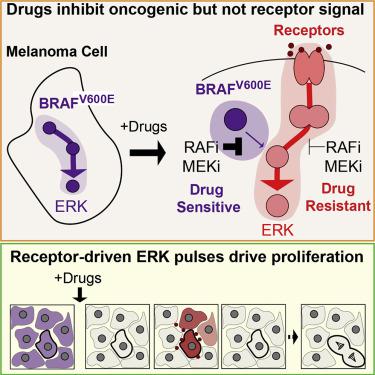Cell Systems ( IF 9.0 ) Pub Date : 2020-10-27 , DOI: 10.1016/j.cels.2020.10.002 Luca Gerosa 1 , Christopher Chidley 1 , Fabian Fröhlich 1 , Gabriela Sanchez 1 , Sang Kyun Lim 1 , Jeremy Muhlich 1 , Jia-Yun Chen 1 , Sreeram Vallabhaneni 1 , Gregory J Baker 1 , Denis Schapiro 2 , Mariya I Atanasova 1 , Lily A Chylek 1 , Tujin Shi 3 , Lian Yi 3 , Carrie D Nicora 3 , Allison Claas 4 , Thomas S C Ng 5 , Rainer H Kohler 5 , Douglas A Lauffenburger 4 , Ralph Weissleder 5 , Miles A Miller 5 , Wei-Jun Qian 3 , H Steven Wiley 6 , Peter K Sorger 1

|
Targeted inhibition of oncogenic pathways can be highly effective in halting the rapid growth of tumors but often leads to the emergence of slowly dividing persister cells, which constitute a reservoir for the selection of drug-resistant clones. In BRAFV600E melanomas, RAF and MEK inhibitors efficiently block oncogenic signaling, but persister cells emerge. Here, we show that persister cells escape drug-induced cell-cycle arrest via brief, sporadic ERK pulses generated by transmembrane receptors and growth factors operating in an autocrine/paracrine manner. Quantitative proteomics and computational modeling show that ERK pulsing is enabled by rewiring of mitogen-activated protein kinase (MAPK) signaling: from an oncogenic BRAFV600E monomer-driven configuration that is drug sensitive to a receptor-driven configuration that involves Ras-GTP and RAF dimers and is highly resistant to RAF and MEK inhibitors. Altogether, this work shows that pulsatile MAPK activation by factors in the microenvironment generates a persistent population of melanoma cells that rewires MAPK signaling to sustain non-genetic drug resistance.
中文翻译:

受体驱动的 ERK 脉冲重新配置 MAPK 信号并实现药物适应性 BRAF 突变黑色素瘤细胞的持久性
靶向抑制致癌途径可以非常有效地阻止肿瘤的快速生长,但通常会导致缓慢分裂的持久细胞的出现,这些细胞构成了选择耐药克隆的库。在 BRAF V600E黑色素瘤中,RAF 和 MEK 抑制剂有效阻断致癌信号,但会出现持久细胞。在这里,我们展示了持久性细胞通过跨膜受体和以自分泌/旁分泌方式运行的生长因子产生的短暂、零星的 ERK 脉冲逃避药物诱导的细胞周期停滞。定量蛋白质组学和计算模型表明,ERK 脉冲是通过重新连接丝裂原活化蛋白激酶 (MAPK) 信号来实现的:来自致癌 BRAF V600E单体驱动构型对受体驱动构型敏感,包括 Ras-GTP 和 RAF 二聚体,对 RAF 和 MEK 抑制剂具有高度抗性。总而言之,这项工作表明,微环境中的因素引起的脉动 MAPK 激活会产生持久的黑色素瘤细胞群,这些细胞重新连接 MAPK 信号以维持非遗传耐药性。











































 京公网安备 11010802027423号
京公网安备 11010802027423号